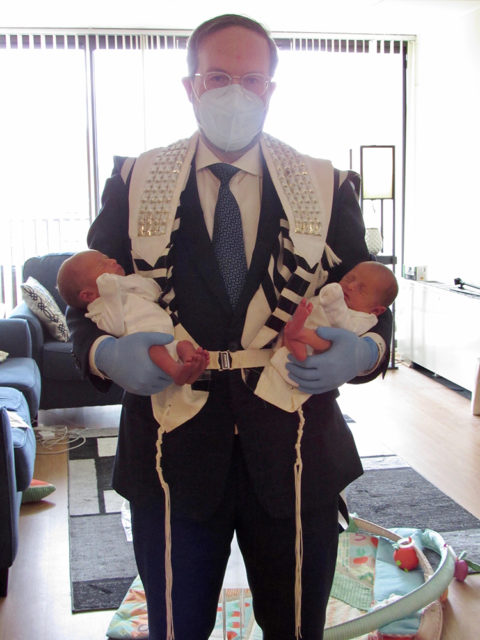Yes, I invented that word.
Because it is what we have all been talking about since the middle of March.
How do we make meaning out of what has happened?
COVID is religious because it is about the ultimate meaning of life. How many of us, thinking about our own fragility and mortality, and those of our loved ones, began the painful and necessary process of re-assessing our lives, and what is important in those lives? How many of us intoned the words of the great theologian, Peggy Lee, and sang: “Is that all there is?”
Let me put it to you this way. When COVID began to be a “thing” in March, I woke up in the middle of the night with the realization that I had not updated my will.
That’s a religious experience.
Add to that: the sense of existential loneliness that many of us felt. That sense of being trapped behind the ghetto walls of our selves. Where was God in all this?
COVID is religious because, once again, it made us think about who God is, and what God does, and how God does it.
There have been several key moments in the last half millennium that have had the same affect.
Certainly the Holocaust was one of such existential moments. But, theologians could interpret that as a surfeit of human evil – the collateral damage of God’s willingness to give huma beings moral agency.
But, the Holocaust was not the biggest disaster that would come to challenge the meaning of God in our time.
Let me bring you back – exactly 265 years ago – to the city of Lisbon, on November 1, 1755. That was the day that a massive earthquake decimated Lisbon – and then, in its wake, a massive tsunami.
November 1 is All Saints Day – and there was barely a city in Europe that had striven to be more saintly than Lisbon. Of its 250,000 residents, fully 25,000 of them, one out of every ten citizens, were priests or monks or nuns. How could this have happened to this holy city? If you ask the historians how many people died on that day, they don’t know. 15,000? 50,000? 60,000?
But, this you must know. In the 1700s, people used the word “Lisbon” the way that we use the word “Auschwitz” today.
No other moment in the history of humanity shook faith the way that Lisbon did. It created waves of religious doubt and secularism and struggle with God that continue to this day.
To quote my teacher, Thomas Long:
The seismic shock waves that destroyed Lisbon were soon followed by moral and theological shock waves that shook the intellectual, philosophical, and religious foundations of Europe and the West, and continue to shake them to this day. Historian Thomas D. Kendrick called the Lisbon earthquake “a disaster that had shocked Western civilization more than any other event since the fall of Rome in the fifth century,” and philosopher Susan Neiman said, “The eighteenth century used the word Lisbon much as we use the word Auschwitz today….”
No other moment in the history of humanity shook faith the way that Lisbon did. It created waves of religious doubt and secularism and struggle with God that continue to this day.
I cannot know – we cannot know – what religious thinkers will be saying about COVID.
Frankly, the idea that God is all powerful and should have stopped a natural disaster – an earthquake, a tsunami, or a pandemic – is the Nehru jacket of theology.
You can wear that jacket, but people will snicker at you. They will wonder how far back in your closet you needed to go in order to find it. They will say that the Nehru jacket is hopelessly passe.
But, on the level of individual loss, COVID has re-ignited such God-talk: “How could God have allowed this to happen to him? To her? To that couple that died hours apart?? Especially because they followed all the ‘rules.'”
My colleagues and I possess old scripts, which are themselves Nehru jackets. It is entirely possible that those theological Nehru jackets will come back into fashion.
Or, perhaps they are like Brooks Brothers suits: a little colorless, but classics nonetheless.
Or perhaps, those Brooks Brothers suits of theology just need a new tie — in the form of new poetry, new metaphors – and in an age of virtual presence – we need to figure out the newest and best ways of being there.
Finally, COVID is religious because it has brought the entire “delivery system” into question. Churches, synagogues, mosques: all have found themselves united in struggling with the question of how we deliver religious services and education in the absence of an in-person world? It started as a technical question: How do we do this on Zoom? But, it rapidly moved to the deeper question: What does it mean for us to do this on Zoom? Who are we? What is the nature of community? Has COVID and technology destroyed community, or has it only hastened the process of re-imagining it? How do we encounter the life cycle on Zoom? What does it mean to be at a Zoom funeral? How do we maintain membership and engagement in this crisis? What will it all look like when it’s done?
Those questions are hardly the only questions that religions will need to face. Here is the next one up: In a world of scarce medical resources, i.e., the vaccine, how do we make ethical issues over who gets priority in receiving it?
The Lisbon earthquake severely tested the religious structure of its time, lubricating the gears of social change and secularization.
COVID will provide the test for our time. Will our religious structures respond, or simply re-hash the old answers?
May it be a blessed 2021. We all need it.






